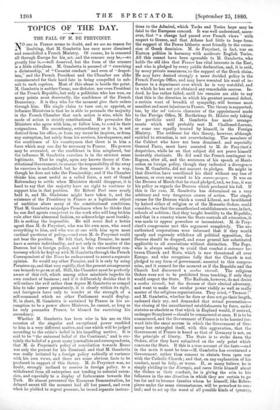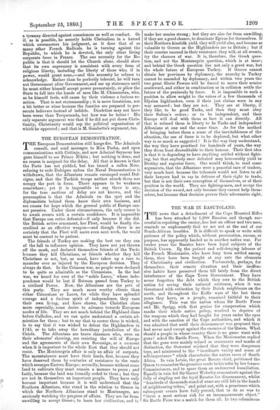TOPICS OF THE DAY.
THE FALL OF M. DE FREYCINET.
NO one in France seems to doubt, and we see no reason for doubting, that M. Gambetta has once more dismissed and remodelled a French Ministry. Of course, he is censured all through Europe for his act, and the censure may be,—we greatly fear is,—well deserved, but the form of the censure is a little ridiculous. M. Gambetta is accused of " exercising a dictatorship," of " Cmarist conduct," and even of "despot- ism," and the French President and the Chamber are alike commiserated for their hard fate in being compelled to sub- mit to such caprices. Most of this abuse is beside the point. M. Gambetta is neither Caesar, nor dictator, nor even President of the French Republic, but only a politician who has won, on many points most deservedly, the confidence of the French Democracy. It is they who for the moment give their orders through him. His single claim to turn out, or appoint, or influence Ministries is that he is able to persuade the majority in the French Chamber that such action is wise, while his mode of action is strictly constitutional. He persuades the Ministers who agree with him, or follow him, to send in their resignations. His ascendancy, extraordinary as it is, is not derived from his office, or from any terror he inspires, or from any corruption, but solely from his services, his eloquence, and the confidence of his countrymen that there is in him a force which may one day be necessary to France. His powers may be overrated, or the confidence in him misplaced, but the influence M. Gambetta exercises is in the strictest sense legitimate. That he ought, upon any known theory of Con- stitutional Government, to assume the responsibility of the sway he exercises is undoubted, but he does assume it in a way, though he does not take the Premiership; and if the Chamber thinks him most useful as a veiled force, a sort of Grand Referendary to settle when Ministries should disappear, it is hard to say that the majority have no right to continue to support him in that position. Sir Robert Peel once nearly held it, and Mr. Gladstone might have taken it, and the existence of the Presidency in France as a legitimate object of ambition alters many of the constitutional conditions. That M. Gambetta misjudges Frenchmen when he thinks that he can find agents competent to the work who will long let him rule after this abnormal fashion, we acknowledge most frankly. He is seeking the impossible. He will never find a better agent than M. de Freycinet, who was his own man, who owed everything to him, and who was at one with him upon most cardinal questions of policy,—and even M. de Freycinet could not bear the position. He felt that, being Premier, he must have a certain individuality, and not only in the matter of the Decrees, but in foreign policy, and in the extraordinary con- troversy which he kept up with M. Gambetta through the French Correspondent of the Tunes he endeavoured to assert a separate opinion. So would any other Premier, and it is only by using Premiers up, and that very rapidly, that the present arrangement can be made to go on at all. Still, the Chamber must be perfectly aware of this evil, which among other mischiefs impedes its own conduct of business ; and if it deliberately decides that it will endure the evil rather than depose M. Gambetta or compel him to take power prematurely, it is clearly within its right, and foreigners have only to wonder at the strength of a self-command which no other Parliament would display. If, in short, M. Gambetta is sustained by France in his as- sumption to be a power above Ministers, he cannot, so long as he only persuades France, be blamed for exercising his ascendancy. Whether M. Gambetta has been wise in his use on this occasion of the singular and exceptional power confided to him is a very different matter, and one which will be judged according to the critic's belief in his impelling motive. It is said to be " the universal belief of the Continent," and is cer- tainly the belief of a great many journalists and correspondents, that M. de Freycinet's policy of conciliation towards Rome was only the pretext for his dismissal, and that M. Gambetta was really irritated by a foreign policy radically at variance with his own views, and there are some obvious facts to be produced in support of this theory. M. de Freycinet was, no doubt, strongly inclined to reserve in foreign policy, to a withdrawal from all enterprises not tending to colonial exten- sion, and especially to a display of forbearance towards the Turk. He almost prevented the European Demonstration, he delayed assent till the moment had all but passed, and even when lie yielded to urgent pressure, he issued separate instrue- tions to the Admiral, which Turks and Tories hope may be fatal to the European concord. It was well understood, more- over, that " a change had passed over French views " with respect to Greece, and that Athens had little to hope from. the support of the Power hitherto most friendly to the exten- sion of Greek dominion. M. de Freycinet, in fact, was on. Eastern politics in harmony with moderate English Tories.. All this cannot have been agreeable to M. Gambetta, who holds the old idea that France has vital interests in the East, and who is pledged by every public declaration, and, it is said, by many private assurances, to the support of the Greek claim.. He may have desired strongly a more decided policy in the. French Foreign Office, and may have resented his want of in- fluence in a department over which he is very watchful, and in which he has not yet obtained any remarkable success.. In- deed, he has rather failed, until his enemies are able to say that this is the direction in which his greatest personal defect, a certain want of breadth of sympathy, will become most" manifest and most injurious to France. The theory is supported, too, by the ad interim character of the appointment made to the Foreign Office, M. Barthelemy St. Hilaire only taking the portfolio until M. Gambetta has made arrange- ments which will probably seat M. Challemel-Lacour, or some one equally trusted by himself, in the Foreign Ministry. The evidence for this theory, however, although entitled to attention, is not overwhelming. The members of the Cabinet who have not been dismissed, and especially General Farre, must have assented to M. de Freycinet's despatches, while he on that subject did not prove himself incurably obstinate. He did send the French contingent to Ragusa, after all, and the sentences of his speech at Mont- auban on foreign policy, though they indicated a divergence from M. Gambetta, did not amount to pledges. He might in that direction have conciliated his chief without any loss of honour, or even any wound to his amour-propre. It was on the Decrees of March that he stood pledged, and, we fear, it was his policy as regards the Decrees which produced his fall. If this is the case, M. Gambetta has determined on a very arbitrary and very dangerous course of action. The single excuse for the Decrees which a sound Liberal, not bewildered by hatred either of religion or of the Monastic Orders, could' consider, was that the unauthorised establishments were, in fact, schools of sedition ; that they taught hostility to the Republic, and that in a country where the State controls all education, it was made to appear powerless or inconsistent. M. de Frey- cinet's compromise met this argument completely. The un- authorised corporations were informed that if they would openly and expressly withdraw all political opposition, the Decrees should be dropped, and some general law substituted applicable to all associations without distinction. The Pope, who is always seeking to avoid that combat a outrance be- tween Church and State, which is now threatened all over Europe, and who recognises fully that the Church is not pledged to any form of government, assented to this compro- mise, and it seemed for the moment as if the Republic and the Church had discovered a modes rivendi. The religious Orders were not to be prohibited from teaching, if only they would respect the State. The Radicals, however, do not desire a 'nodes rirendi, but the decease of their clerical adversary, and want to make the secular power visibly as well as really master of the religious organisations. They cried, " Treason !" and M. Gambetta, whether he does or does not go their length, endorsed their cry, and demanded that actual persecution— the closing of the unauthorised establishments by force, under statutes as obsolete as that which in England would, if revived, endanger Stonyhurst —should be commenced at once. It is to be commenced, and the Government of France is to be hurried for- ward into the same morass in which the Government of Ger- many has entangled itself, with this aggravation, that the Government of France is based as that of Germany is not, on the principle of liberty. The State is to strike down the Orders, after they have submitted on the only point which concerns the State. If this is a true account of the facts—and in the main it must be true—M. Gambetta has overturned a Government, rather than consent to abstain from open war with the Catholic Church ; and that, on any explanation of his conduct, must be folly, or worse. If, as many believe, he is simply yielding to the Enrages, and cares little himself about the Orders or their conduct, he is giving the rein to his followers in the one direction in which they are certain to go too far and to become fanatics whom he himself, like Robes- pierre under the same circumstances, will be powerless to con- trol; and to set up the worst of all possible kinds of tyranny, a tyranny directed against consciences as well as conduct. Or if, as is possible, he secretly holds Clericalism in a hatred • which overmasters his judgment, as it does that of so many other French Radicals, he is turning against the Republic, to which he is devoted, the only other living corporate force in France. The one necessity for the Re- public is that it should let the Church alone, should shew that its own supremacy is consistent with every form of religious liberty, including the liberty of those who, if in power, would grant none,—and this necessity he refuses to acknowledge. Rather than be perfectly tolerant, he will turn out Government after Government, and use up statesmen until he must either himself accept power prematurely, or !Mow the State to fall into the hands of men like M. Clemenceau, who, as he himself feels, will cause by their violence a furious re- action. That is not statesmanship ; it is mere fanaticism, not a bit better or wiser because the fanatics are prepared to per- secute believers instead of infidels. Diocletian may not have been worse than Torquemada, but how was he better ? His only separate argument was that if he did not put down Chris- tianity, Christianity would sap the political organisation of which he approved ; and that is M. Gambetta's argument, too.



































 Previous page
Previous page